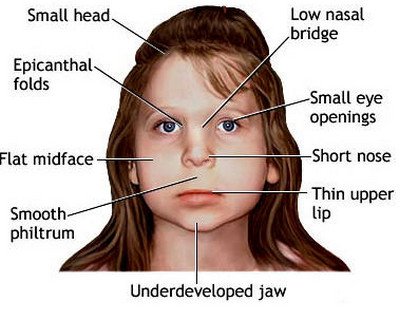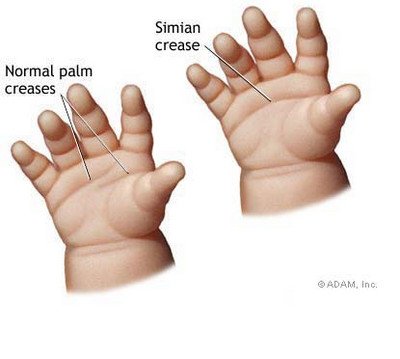What is Fetal Alcohol Syndrome?
FAS or fetal alcohol syndrome is a series of conditions and defects of the mental and physical aspects of a person who has been subjected to alcohol exposure when he or she was still a fetus in the womb of the mother, the alcohol exposure of the growing fetus is attributed to the intake of alcoholic beverages by the pregnant woman. The amount and frequency of alcohol intake during the trimesters of pregnancy plays an important part in the development of fetal alcohol syndrome in a baby. Although drinking alcoholic beverages during pregnancy does not guarantee that the child will subsequently develop FAS or fetal alcohol syndrome, and there are no extensive studies and statistics as to what exactly is the amount of alcohol that can cause fetal alcohol syndrome, it is better to play is safe and have the pregnant woman avoid any intake of alcohol at any time during the whole pregnancy.
Fetal Alcohol syndrome was first officially described by French physicians in 1968, when they studied more than 100 children with alcoholic mothers. The report was made public through a pediatric journal but was not given much attention until 1973, when a group of Americans studied 8 children whose mothers were chronic alcoholics and published their report in a British medical journal.
Alcohol is a known teratogen, or a substance that can cause abnormalities in a developing fetus, in fact it is the most common teratogen to which developing fetuses are exposed. Alcohol can cross the placental barrier easily and get absorbed into the system of the developing fetus, causing a number of abnormalities in growth and development.
Fetal alcohol syndrome in Children
Children with fetal alcohol syndrome exhibit a number of physical signs and symptoms as well as different mental development problems. A child with fetal alcohol syndrome may have problems in socialization and can exhibit exaggerated tantrums that are normally experienced by children during this stage. Some behavioral problems like a decreased attention span, inability to concentrate, unpredictable tantrums and mood swings, decreased intellectual capacity, impulsivity, irresponsibility, and an overall difficulty in discipline, may be exhibited by a child affected by fetal alcohol syndrome.
The physical features of children with fetal alcohol syndrome are more noticeable and are usually the first clues to the child’s condition. Children with FAS usually have problems in their sense organs like the eyes and ears, with some difficulties in eyesight like myopia and some hearing problems. Abnormalities in dentition are also common, like discolored and malaligned teeth.
Fetal alcohol syndrome in Adults
As the children with fetal alcohol syndrome grow and become adults, they can still carry with them the mental and behavioral problems exhibited during their childhood. The problems in mental development can cause them to perform poorly at school and at work, often causing a degree of frustration. Conforming with the social rules of society may also be hard for adults with FAS, since their behavioral problems are interfering with how they conduct themselves, young adults with fetal alcohol syndrome have been found to have increased tendencies to become violent, use illicit, and become alcoholics. These behaviors are still attributed to the abnormal mental development of people with FAS.
Fetal alcohol syndrome causes
As we all know, the primary culprit for the occurrence of fetal alcohol syndrome is a woman consuming alcoholic beverages during pregnancy. The alcohol taken in by the pregnant woman gets absorbed into her system and easily bypasses the placental barrier to the system of the developing fetus. While taking in excessive amounts of alcohol or binge drinking is more dangerous, even small amounts of alcohol in the system of a pregnant may still cause fetal alcohol syndrome because there is no such thing as a “safe” dose of alcohol for a pregnant female. Although taking in of alcohol at any time during the pregnancy is dangerous, the time where the most abnormalities occur is during the first trimester of a pregnancy, as the fetus is developing most major functions during this time.
Signs of Fetal Alcohol Syndrome
You can most probably tell if a child suffers from fetal alcohol syndrome just by looking at the physical appearance of the person suffering from this disorder, some of the most common tell-tale physical signs of fetal alcohol syndrome are the following;
A small head or microcephalic appearance, this is primarily due to the stunted development of the brain, causing the skull to develop in a much smaller scale compared to that of a normal child’s head circumference, microcepaly in children with FAS can either be mild or moderate.
A person with FAS may also exhibit abnormalities in gait and posture because of the abnormal maturation of bones, this also least FAS patients to be smaller and with bone abnormalities in the fingers.
Simean crease, this is evident on the palms of people with fetal alcohol syndrome, it is describe as a straight crease beginning from one end of the palm, and all the way to the other end, unlike the normal palm creases where there usually are different creases lining the palm. The simian crease is a sign of developmental retardation.
Other birth defects may include deformities in the central nervous system like myelomeningocele, where the spine or backbone does not fully fuse before the child is born, it results in the protrusion of the spinal column and some brain matter outside the body. Other birth defects that may be present are, hydrocephalus, hear murmurs, coarctation of the aorta, and cleft palate or cleft lip
Fetal alcohol syndrome Symptoms
Fetal alcohol syndrome has a variety of symptoms that positively identifies the disease, although all these symptoms need not be completely present in order to diagnose a child with FAS, some of the symptoms may or may not appear in a child with FAS.
The most common symptoms of Fetal Alcohol Syndrome are the following;
Slowed or stunted physical growth and development, coupled with abnormalities in bone structure and body proportions.
Behavioral and social problems, a child with fetal alcohol syndrome may perform poorly in school and exhibit characteristics like that of children with ADHD or attention deficit and hyperactive disorder.
Impaired fine motor skills, tremors, and decreased eye and hand coordination. People suffering from FAS may also present with very low IQ, usually in the 60s, which is classified as mind mental retardation.
Fetal alcohol syndrome Facial features
The facial features of a person with FAS are very distinctive to this condition and often become the basis for its diagnosis. The facial features include; a sunken nasal bridge, short eye openings, flat cheekbones, short and flat nose, absence of the ridge between the nose and upper lip which is also called the philtrum, this area becomes smooth and widened, and a thin vermillion or thin upper lip.
These facial features are generally believed to have developed with the 10 and 12 week of pregnancy and it is said that patients who present with all the facial features attributed to fetal alcohol syndrome are more often than not, mentally retarded.
Fetal alcohol syndrome Pictures and Photos
 Picture 1 : Fetal Alcohol Syndrome features
Picture 1 : Fetal Alcohol Syndrome features
Picture 2 : Fetal Alcohol Syndrome Facial features
Image source: people.uwec.edu
Picture 3 : Simian crease
Image source : Adam Inc
Pictures 4: Fetal Alcohol Syndrome features in young child
Photo source: nsnet.org
Fetal alcohol syndrome Effects
The most common effect of fetal alcohol syndrome is the delay and permanent retardation of mental functioning because of the irreversible damage done to the central nervous system during development. Aside from the small size of the brain, there are also more evident mental impairments like poor attention span, poor cause and effect relation, irresponsibility and disregard for the consequences of an action, and a very poor memory recall. This condition is the single most common cause of mental or intellectual disability in most western countries.
Fetal alcohol syndrome Diagnosis
There are four criteria that must be present in a person for the physicians to be able to confirm a diagnosis of fetal alcohol syndrome, these are; the presence of fetal alcohol syndrome facial features, significant central nervous system abnormality or damage, growth and development retardation, and the presence of alcohol exposure during the fetal stage.
Fetal alcohol syndrome Treatment
Treatment for fetal alcohol syndrome is geared towards rehabilitation and preventing further damage to the brain through therapy and medication. Sadly, once the physical and mental effects of the disease have set in, there is nothing that can reverse it. This is one of those situations where the saying, “prevention is better than cure” is truly applicable, because the best thing that can be done is to avert its occurrence by preventing the intake of alcohol for pregnant women. Women with alcoholism problems should also seek counseling and substance abuse rehabilitation before even trying to get pregnant.
Fetal alcohol syndrome Facts
The facts about fetal alcohol syndrome remain the same, its effects on a child are irreversible and there is no known cure for it, not even the smallest amount of alcohol is safe to be taken for a woman who is pregnant, and most importantly, fetal alcohol syndrome is completely preventable.
Fetal alcohol syndrome Statistics
Recent statistics have shown that fetal alcohol syndrome is more widespread and occurs more frequently across the entire planet than diseases like AIDS. In the US and Europe, one in 100 babies being born has FAS and up to thirty percent of pregnant women have taken alcohol during pregnancy.



